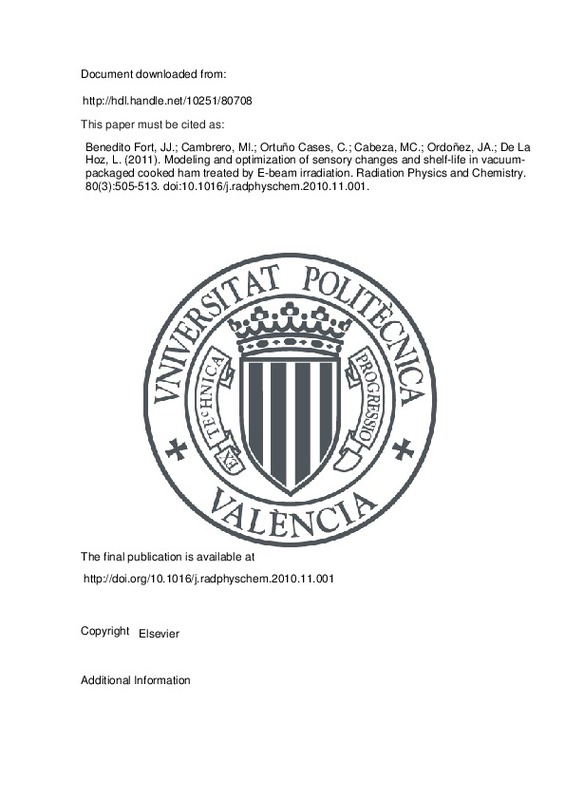Benedito Fort, JJ.; Cambero, MI.; Ortuño Cases, C.; Cabeza, MC.; Ordoñez, JA.; De La Hoz, L. (2011). Modeling and optimization of sensory changes and shelf-life in vacuum-packaged cooked ham treated by E-beam irradiation. Radiation Physics and Chemistry. 80(3):505-513. https://doi.org/10.1016/j.radphyschem.2010.11.001
Por favor, use este identificador para citar o enlazar este ítem: http://hdl.handle.net/10251/80708
|
Título:
|
Modeling and optimization of sensory changes and shelf-life in vacuum-packaged cooked ham treated by E-beam irradiation
|
|
Autor:
|

 Benedito Fort, José Javier
Cambero, M. I.
Ortuño Cases, Carmen
Cabeza, M. C.
Ordoñez, J. A.
De la Hoz, L.
Benedito Fort, José Javier
Cambero, M. I.
Ortuño Cases, Carmen
Cabeza, M. C.
Ordoñez, J. A.
De la Hoz, L.
|
|
Entidad UPV:
|
Universitat Politècnica de València. Departamento de Tecnología de Alimentos - Departament de Tecnologia d'Aliments
Universitat Politècnica de València. Escuela Técnica Superior de Ingeniería Agronómica y del Medio Natural - Escola Tècnica Superior d'Enginyeria Agronòmica i del Medi Natural
|
|
Fecha difusión:
|
|
|
Resumen:
|
[EN] The E-beam irradiation of vacuum-packaged RTE cooked ham was carried out to establish the dose required to achieve the food safety objective (FSO) and to minimize changes in selected sensory attributes. Cooked ham was ...[+]
[EN] The E-beam irradiation of vacuum-packaged RTE cooked ham was carried out to establish the dose required to achieve the food safety objective (FSO) and to minimize changes in selected sensory attributes. Cooked ham was irradiated with doses ranging 1-4 kGy. After the treatment, the microbial inactivation of Listeria monocytogenes, the shelf-life of the product and some sensory attributes (appearance, odor, and flavor) were determined. The inactivation of L monocytogenes was satisfactorily described by a first-order kinetics equation (R2=0.99). The influence of the irradiation dose on appearance, odor, and flavor was modeled through Gompertz (R2=0.99, for appearance) and Activation/Inactivation (R2=0.99, for odor and flavor) equations. A model was also developed to determine the shelf-life of irradiated cooked ham depending on the irradiation dose (R2 > 0.91). The dose that maximized the scores of the sensory attributes was 0.96 kGy resulting in an acceptable sensory quality for 80 days. It is possible to apply up to 2 kGy to ensure microbial safety, while provoking no significant changes in the above mentioned sensory attributes. (C) 2010 Elsevier Ltd. All rights reserved.
[-]
|
|
Palabras clave:
|
E-beam irradiation
,
Microbial safety
,
Modeling
,
Quality attributes
,
Shelf-life
,
Shelf life
,
Health
,
Listeria
,
Meats
,
Radiation
,
Vacuum
,
Irradiation
,
Article
,
Cooking
,
Flavor
,
Food packaging
,
Food processing
,
Food quality
,
Food safety
,
Listeria monocytogenes
,
Mathematical model
,
Meat
,
Nonhuman
,
Odor
,
Process optimization
,
Radiation dose
,
Scoring system
|
|
Derechos de uso:
|
Reconocimiento - No comercial - Sin obra derivada (by-nc-nd)
|
|
Fuente:
|
Radiation Physics and Chemistry. (issn:
0969-806X
)
|
|
DOI:
|
10.1016/j.radphyschem.2010.11.001
|
|
Editorial:
|
Elsevier
|
|
Versión del editor:
|
http://doi.org/10.1016/j.radphyschem.2010.11.001
|
|
Código del Proyecto:
|
info:eu-repo/grantAgreement/MEC//CSD2007-00016/ES/PRODUCTOS CARNICOS PARA EL SIGLO XXI: SEGUROS, NUTRITIVOS Y SALUDABLES/
|
|
Agradecimientos:
|
The authors acknowledge the financial support from the Project CSD2007-00016 (CONSOLIDER-INGENIO 2010) funded by the Spanish Ministry of Science and Innovation.
|
|
Tipo:
|
Artículo
|







![[Cerrado]](/themes/UPV/images/candado.png)


